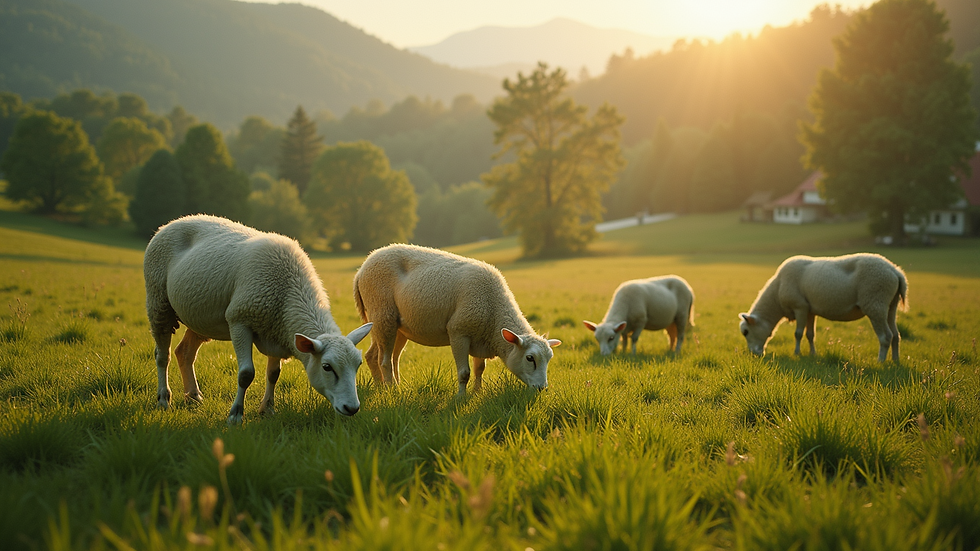Understanding the Benefits of Free-Range Farming
- alpacasjilliby
- Sep 1, 2025
- 4 min read
Free-range farming has gained significant attention in recent years as a sustainable and ethical approach to raising farm animals. This method allows animals to roam freely outdoors, promoting natural behaviours and improving their overall well-being. In this article, we will explore the many benefits of free-range farming, focusing on how it enhances the farm animals experience, supports environmental health, and provides superior quality products.
Enhancing the Farm Animals Experience Through Free-Range Practices
Free-range farming prioritises the welfare of animals by giving them access to open spaces where they can move, forage, and socialise naturally. Unlike conventional confined systems, free-range environments reduce stress and promote healthier lifestyles for animals.
For example, chickens raised in free-range systems can peck at the ground, dust bathe, and stretch their wings. These activities are essential for their physical and mental health. Similarly, other farm animals such as sheep, cattle, and pigs benefit from grazing and exploring diverse terrains.
Key benefits for animals include:
Increased freedom of movement
Reduced risk of disease due to better ventilation and hygiene
Improved muscle tone and bone strength
Enhanced natural behaviours that reduce boredom and aggression
By providing a more natural habitat, free-range farming supports happier and healthier animals, which is a crucial aspect of ethical farming.

Environmental Advantages of Free-Range Farming: A True Farm Animals Experience
Free-range farming is not only beneficial for animals but also for the environment. This method encourages sustainable land use and reduces the negative impacts often associated with intensive farming.
Some environmental benefits include:
Soil Health Improvement
Animals grazing on pasture help maintain soil fertility by naturally fertilising the land with manure. Their movement also aids in aerating the soil, promoting better water absorption and root growth.
Biodiversity Support
Free-range farms often maintain diverse plant species and habitats, which support a variety of wildlife. This biodiversity helps create balanced ecosystems and reduces the need for chemical inputs.
Lower Carbon Footprint
By avoiding intensive feedlots and synthetic fertilisers, free-range farming can reduce greenhouse gas emissions. Grazing animals also contribute to carbon sequestration in healthy pastures.
Water Conservation
Well-managed free-range systems use water more efficiently and reduce runoff pollution compared to confined animal feeding operations.
Farmers adopting free-range methods often implement rotational grazing and other regenerative practices that further enhance environmental outcomes.

Will Guineas Fly Away?
One common question about free-range farming is whether certain animals, such as guineas, will fly away when given the freedom to roam. Guineas are known for their strong flying ability compared to other poultry, which can make managing them in a free-range setting a bit challenging.
However, with proper fencing and environmental enrichment, guineas can be successfully kept within designated areas. Providing ample food, water, and shelter encourages them to stay close to the farmstead. Additionally, guineas are social birds and tend to stay with their flock, reducing the likelihood of escape.
For those interested in raising guineas, it is worth noting that free-range guinea fowl can thrive in well-managed environments. They contribute to pest control by eating ticks and insects, making them valuable additions to a free-range farm.
For more information on managing guineas in free-range settings, check out this resource on free-range guinea fowl.

Nutritional and Health Benefits of Free-Range Animal Products
Consumers are increasingly seeking food products that are not only tasty but also nutritious and ethically produced. Free-range farming delivers on these expectations by producing higher quality meat, eggs, and dairy.
Research shows that free-range animal products often contain:
Higher levels of omega-3 fatty acids
Increased vitamins such as A and E
Better protein quality
Lower cholesterol and saturated fat content
These nutritional advantages come from the animals’ varied diet and active lifestyle. For example, free-range chickens consuming insects and plants produce eggs with richer yolks and improved flavour.
Moreover, free-range products are less likely to contain antibiotic residues or harmful chemicals, as these farms typically avoid routine antibiotic use and synthetic additives.
Tips for consumers:
Look for certified free-range labels to ensure animal welfare standards
Support local farms practising sustainable free-range methods
Experiment with free-range products in your cooking to appreciate their superior taste

Practical Steps to Start Your Own Free-Range Farm
If you are considering starting a free-range farm, here are some practical recommendations to help you succeed:
Plan Your Space
Ensure you have enough land to allow animals to roam freely. The size depends on the species and number of animals.
Invest in Proper Fencing
Use secure fencing to protect animals from predators and prevent them from wandering off.
Provide Shelter and Shade
Animals need protection from extreme weather. Build shelters that offer shade and safety.
Implement Rotational Grazing
Move animals between paddocks to prevent overgrazing and maintain pasture health.
Monitor Animal Health Regularly
Keep an eye on your animals for signs of illness or distress and provide timely care.
Maintain Clean Water and Feed
Ensure animals have constant access to fresh water and nutritious feed to supplement their natural diet.
Educate Yourself Continuously
Stay informed about best practices in free-range farming through workshops, books, and online resources.
By following these steps, you can create a thriving free-range farm that benefits both animals and the environment.
Free-range farming offers a holistic approach to agriculture that respects animal welfare, supports environmental sustainability, and delivers high-quality products. Whether you are a consumer or a farmer, understanding these benefits can help you make informed choices that contribute to a healthier planet and better farm animals experience.


Comments